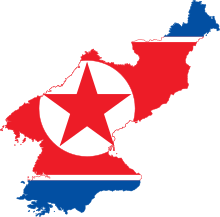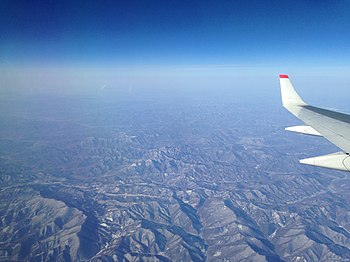Portal:North Korea
 The North Korea Portal The North Korea PortalIntroduction North Korea, officially the Democratic People's Republic of Korea (DPRK), is a country in East Asia. It constitutes the northern half of the Korean Peninsula and borders China and Russia to the north at the Yalu (Amnok) and Tumen rivers, and South Korea to the south at the Korean Demilitarized Zone. The country's western border is formed by the Yellow Sea, while its eastern border is defined by the Sea of Japan. North Korea, like its southern counterpart, claims to be the legitimate government of the entire peninsula and adjacent islands. Pyongyang is the capital and largest city. The Korean Peninsula was first inhabited as early as the Lower Paleolithic period. Its first kingdom was noted in Chinese records in the early 7th century BCE. Following the unification of the Three Kingdoms of Korea into Silla and Balhae in the late 7th century, Korea was ruled by the Goryeo dynasty (918–1392) and the Joseon dynasty (1392–1897). The succeeding Korean Empire (1897–1910) was annexed in 1910 into the Empire of Japan. In 1945, after the Japanese surrender at the end of World War II, Korea was divided into two zones along the 38th parallel, with the north occupied by the Soviet Union and the south occupied by the United States. In 1948, separate governments were formed in Korea: the socialist and Soviet-aligned Democratic People's Republic of Korea in the north, and the capitalist, Western-aligned Republic of Korea in the south. The Korean War began when North Korean forces invaded South Korea in 1950. In 1953, the Korean Armistice Agreement brought about a ceasefire and established a demilitarized zone (DMZ), but no formal peace treaty has ever been signed. Post-war North Korea benefited greatly from economic aid and expertise provided by other Eastern Bloc countries. However, Kim Il Sung, North Korea's first leader, promoted his personal philosophy of Juche as the state ideology. Pyongyang's international isolation sharply accelerated from the 1980s onwards as the Cold War came to an end. The fall of the Soviet Union in 1991 then brought about a sharp decline to the North Korean economy. From 1994 to 1998, North Korea suffered a famine with the population continuing to suffer from malnutrition. In 2024, the DPRK formally abandoned efforts to peacefully reunify Korea. North Korea is a totalitarian dictatorship with a comprehensive cult of personality around the Kim family. Amnesty International considers the country to have the worst human rights record in the world. Officially, North Korea is an "independent socialist state" which holds democratic elections; however, outside observers have described the elections as unfair, uncompetitive, and pre-determined, in a manner similar to elections in the Soviet Union. The Workers' Party of Korea is the ruling party of North Korea. According to Article 3 of the constitution, Kimilsungism–Kimjongilism is the official ideology of North Korea. The means of production are owned by the state through state-run enterprises and collectivized farms. Most services—such as healthcare, education, housing, and food production—are subsidized or state-funded. North Korea follows Songun, a "military first" policy which prioritizes the Korean People's Army in state affairs and the allocation of resources. It possesses nuclear weapons. Its active-duty army of 1.28 million soldiers is the fourth-largest in the world. In addition to being a member of the United Nations since 1991, North Korea is also a member of the Non-Aligned Movement, G77, and the ASEAN Regional Forum. (Full article...) Selected article - The Workers' Party of Korea (WPK) is the sole ruling party of the Democratic People's Republic of Korea, commonly known as North Korea. Founded in 1949 from a merger between the Workers' Party of North Korea and the Workers' Party of South Korea, the WPK is the oldest active party in Korea. It also controls the Korean People's Army, North Korea's armed forces. The WPK is the largest party represented in the Supreme People's Assembly and coexists with two other legal parties that are completely subservient to the WPK and must accept the WPK's "leading role" as a condition of their existence. The WPK is banned in the Republic of Korea (South Korea) under the National Security Act and is sanctioned by the United Nations, the European Union, Australia, and the United States. Officially, the WPK is a communist party guided by Kimilsungism–Kimjongilism, a synthesis of the ideas of Kim Il Sung and Kim Jong Il. The party is committed to Juche, an ideology attributed to Kim Il Sung which promotes national independence and development through the efforts of the popular masses. Although Juche was originally presented as the Korean interpretation of Marxism–Leninism, the party now presents it as a freestanding philosophy. The WPK recognizes the ruling Kim family as the ultimate source of its political thought. The fourth party conference, held in 2012, amended the party rules to state that Kimilsungism–Kimjongilism was "the only guiding idea of the party". Under Kim Jong Il, who governed as chairman of the National Defence Commission, communism was steadily removed from party and state documents in favor of Songun, or military-first politics. The military, rather than the working class, was established as the base of political power. However, his successor Kim Jong Un reversed this position in 2021, replacing Songun with "people-first politics" as the party's political method and reasserting the party's commitment to communism. The WPK is organized according to the Monolithic Ideological System, conceived by Kim Yong-ju and Kim Jong Il. The highest body of the WPK is formally the party congress; however, before Kim Jong Un's tenure as party leader, a congress rarely occurred. Between 1980 and 2016, there were no congresses held. Although the WPK is organizationally similar to other communist parties, in practice it is far less institutionalized and informal politics plays a larger role than usual. Institutions such as the Central Committee, the Secretariat, the Central Military Commission (CMC), the Politburo and the Politburo's Presidium have much less power than what is formally bestowed on them by the party rules. Kim Jong Un is the current party leader, serving as General Secretary of the WPK. (Full article...)CategoriesRelated portalsCommunist countries in Asia Other countries North Korea in the news
Selected image -
Mountainous view seen from aboard Air Koryo
Did you know (auto-generated)
More did you know
General images -The following are images from various North Korea-related articles on Wikipedia.
North Korea topicsThings you can do
Associated WikimediaThe following Wikimedia Foundation sister projects provide more on this subject:
Web resources
Notes Discover Wikipedia using portals |













































